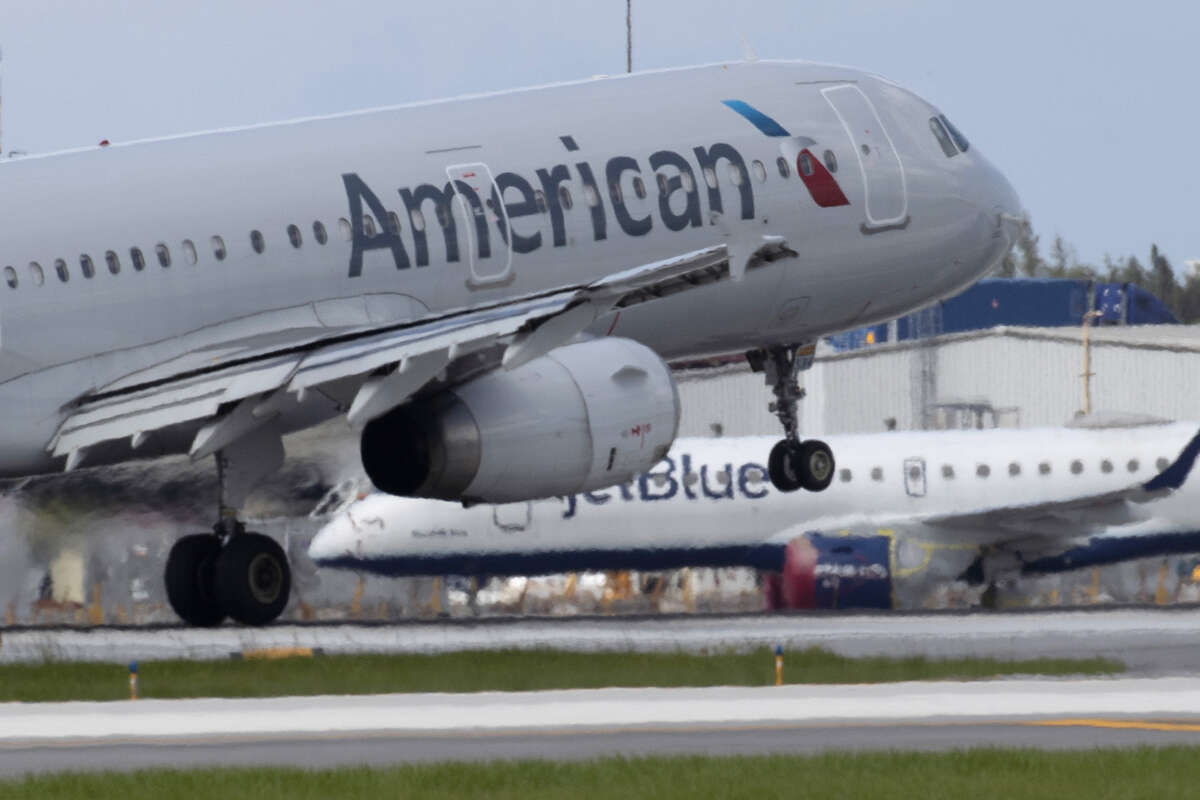Honest, paywall-free news is rare. Please support our boldly independent journalism with a donation of any size.
A Massachusetts-based federal judge on Friday sided with the Biden administration plus six states and the District of Columbia, which launched an antitrust challenge to American Airlines and JetBlue Airways’ “de facto merger” for Boston and New York City.
The U.S. Department of Justice (DOJ) along with the attorneys general of Arizona, California, Florida, Massachusetts, Pennsylvania, Virginia, and D.C. filed a civil lawsuit over the airlines’ Northeast Alliance (NEA) in September 2021.
“This case turns on what ‘competition’ means,” U.S. District Court Judge Leo Sorokin, an appointee of former President Barack Obama, wrote Friday. “To the defendants, competition is enhanced if they join forces to unseat a powerful rival. The Sherman Act, however, has a different focus.”
“Federal antitrust law is not concerned with making individual competitors larger or more powerful. It aims to preserve the free functioning of markets and foster participation by a diverse array of competitors,” the judge added. “Those principles are generally undermined, rather than promoted, by agreements among horizontal competitors to dispense with competition and cooperate instead. That is precisely what happened here.”
A federal judge ruled today that JetBlue and America’s alliance amounted to an illegal merger. Another big win for DOJ Antitrust.https://t.co/wuzrarwi5b
— David Dayen (@ddayen) May 19, 2023
Sorokin stressed that “American and JetBlue are two of the four largest carriers operating in New York, and two of the largest three in Boston. Delta Air Lines is the only other carrier with a large presence in Boston. Besides Delta and United Airlines, no other carrier matches or approaches in size the defendants’ respective positions in New York.”
After noting that the pair established the “first-of-its-kind alliance” in 2020, he explained:
This was a sea change in the relationship between two airlines that were direct and aggressive competitors with decidedly different business models and cost structures. There is no doubt that savvy executives representing both defendants earnestly believe the NEA promotes the interests of their respective shareholders and will strengthen American and JetBlue in their rivalry against Delta (and, to a lesser extent, United) in New York and Boston. It is similarly beyond dispute that the NEA involves substantial coordination by two powerful competitors in an industry that, on a domestic level, is closely regulated, highly concentrated, and often volatile.
Reuters reported that after Sorokin ordered the end of the alliance within 30 days, “JetBlue shares fell 1.8% for the day, while American closed down 1.5%,” and both airlines said “they were evaluating their next steps.”
Meanwhile, the DOJ, its state partners, and other critics of consolidation celebrated the initial court victory.
“Today’s decision is a win for Americans who rely on competition between airlines to travel affordably,” said Attorney General Merrick Garland in a statement. “The Justice Department will continue to protect competition and enforce our antitrust laws in the heavily consolidated airline industry and across every industry.”
A “de facto merger” between @JetBlue
and @AmericanAir could have added $700 million in annual costs for consumers. Thanks to @JusticeATR and @MassAGO Campbell for fighting to keep the airline industry competitive—this is a win for folks in MA and beyond. https://t.co/ZZxHFPVH33— Elizabeth Warren (@SenWarren) May 20, 2023
American Economic Liberties Project senior fellow for aviation and travel William McGee agreed that the DOJ Antitrust Division’s successful challenge of the NEA “is a win for passengers and the public.”
“Blocking this de facto merger forces JetBlue and American to continue competing, eliminating anti-competitive revenue-sharing incentives and setting an important precedent against future consolidation in the industry,” McGee said. “We hope to see a similar ruling in favor of the Justice Department’s suit against the JetBlue-Spirit merger, another illegal deal that would accelerate concentration and drive up fares nationwide.”
The context for this is a 45-year trend toward concentration and anticompetitive re-orientation of routes since the industry was deregulated in 1978. @WilliamJMcGee and I have a forthcoming piece describing the myriad failures of the deregulation experiment. This is a good day. https://t.co/PfAUPRAwiO
— Lee Hepner (@LeeHepner) May 19, 2023
As Common Dreams reported in March, the DOJ joined with the attorneys general of Massachusetts, New York, and D.C. to file a civil suit against the JetBlue-Spirit merger, arguing that “by eliminating that competition and further consolidating the United States airlines industry, the proposed transaction will increase fares and reduce choice on routes across the country, raising costs for the flying public and harming cost-conscious fliers most acutely.”
McGee said at the time that by “blocking this blatantly anti-competitive deal, the Department of Justice is standing up for passengers, workers, and communities across the country.”
Speaking against the authoritarian crackdown
In the midst of a nationwide attack on civil liberties, Truthout urgently needs your help.
Journalism is a critical tool in the fight against Trump and his extremist agenda. The right wing knows this — that’s why they’ve taken over many legacy media publications.
But we won’t let truth be replaced by propaganda. As the Trump administration works to silence dissent, please support nonprofit independent journalism. Truthout is almost entirely funded by individual giving, so a one-time or monthly donation goes a long way. Click below to sustain our work.
